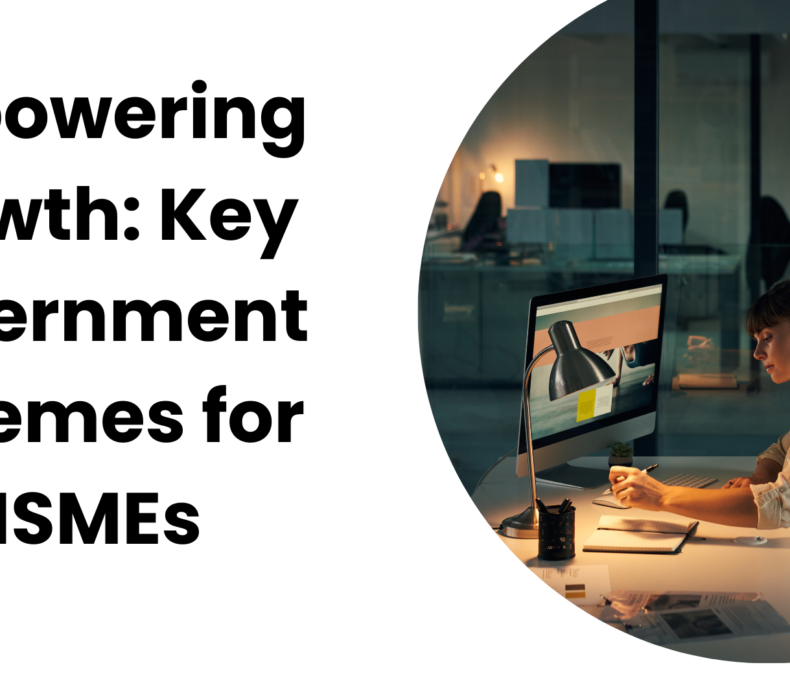Introduction:
Micro, Small, and Medium Enterprises (MSMEs) are the backbone of any economy, fostering innovation, generating employment, and contributing significantly to economic growth. Recognizing their pivotal role, governments around the world introduce various schemes and initiatives to support and empower these enterprises. In this article, we delve into some of the key government schemes designed specifically for MSME Registration.
Government Schemes for MSMEs
Credit Guarantee Fund Scheme for Micro and Small Enterprises (CGS):
This scheme aims to provide collateral-free credit to MSMEs by offering a credit guarantee to financial institutions. It enables easier access to credit for entrepreneurs, thereby fostering business growth and expansion without the burden of collateral security.
Prime Minister’s Employment Generation Programme (PMEGP):
PMEGP is aimed at generating employment opportunities in rural as well as urban areas by promoting entrepreneurship. It provides financial assistance for setting up new ventures or expanding existing ones through various sectors like manufacturing, services, and agro-based industries.
Technology Upgradation Fund Scheme (TUFS):
TUFS facilitates the technological modernization and upgradation of MSMEs by providing subsidised loans for acquiring and installing upgraded technology and machinery. This aids in improving productivity, quality, and competitiveness in the market.
Skill India Programme:
Skill India focuses on enhancing the skill set of the workforce in MSMEs by providing training programs tailored to industry needs. This initiative ensures that employees are equipped with the necessary skills to meet evolving market demands, thereby enhancing the overall productivity of MSMEs.
Market Development Assistance (MDA) Scheme:
MDA aims to encourage MSMEs to explore international markets by reimbursing a portion of the expenses incurred in export promotion activities. This scheme assists in increasing the global presence of MSMEs and facilitates their participation in international trade.
Credit Linked Capital Subsidy Scheme (CLCSS):
CLCSS aims to facilitate technology upgradation in MSMEs by providing capital subsidy for the acquisition of modern machinery. This scheme encourages the adoption of new and improved technologies, thereby enhancing productivity and competitiveness.
Stand-Up India Scheme:
Stand-Up India promotes entrepreneurship among women and individuals from marginalized communities by providing loans for starting greenfield enterprises. This scheme encourages inclusive growth and economic empowerment by supporting entrepreneurship among underprivileged sections of society.
MSMEs Sambandh:
MSME Sambandh is an online portal launched by the Government of India to monitor the implementation and progress of various schemes for MSMEs. It serves as a platform for MSMEs to access information, register grievances, and seek assistance related to government schemes.
Zero Defect Zero Effect (ZED) Certification Scheme:
ZED Certification aims to enhance the quality of products manufactured by MSMEs while promoting the adoption of clean and sustainable production processes. This certification scheme encourages MSMEs to achieve global benchmarks in quality and environmental performance.
GST (Goods and Services Tax) Composition Scheme:
The GST Composition Scheme simplifies the tax compliance process for small businesses with a turnover up to a specified limit. It allows eligible MSMEs to pay tax at a fixed rate based on their turnover, reducing the compliance burden and promoting ease of doing business.
These government initiatives collectively address various aspects crucial for the growth and sustenance of MSMEs. By providing financial assistance, technological support, skill enhancement, market access, and simplifying regulatory procedures, these schemes aim to create a conducive ecosystem for MSMEs to thrive and contribute significantly to economic development.
It’s essential for MSMEs to stay informed about these schemes and take advantage of the benefits offered to strengthen their businesses. Government support, coupled with innovation and a proactive approach, can propel the growth of MSMEs, fostering a robust and inclusive economic landscape.
Cluster Development Programme (CDP):
CDP focuses on enhancing the competitiveness of MSMEs by forming clusters of industries working in close geographical proximity. It facilitates common infrastructure development, technology transfer, skill development, and market linkages among enterprises within the cluster.
Scheme for Promotion of Innovation, Rural Industry and Entrepreneurship (ASPIRE):
ASPIRE encourages innovation and entrepreneurship in rural areas by supporting incubation centers, technology hubs, and livelihood business incubators. It aims to create a conducive ecosystem for nurturing startups and promoting rural industries.
National SC-ST Hub:
This initiative focuses on supporting MSMEs owned by entrepreneurs from Scheduled Castes (SC) and Scheduled Tribes (ST). The hub provides various assistance measures, including capacity building, financial support, and market linkages, to promote entrepreneurship among these communities.
Single Window Clearance for MSMEs:
Several states have introduced a single window clearance system for MSMEs, streamlining the process of obtaining necessary approvals, licenses, and registrations from multiple departments. This initiative aims to reduce bureaucratic hurdles and enhance the ease of doing business for MSMEs.
Procurement Policy for MSMEs:
Governments often have procurement policies that mandate a certain percentage of procurement from MSMEs. This preference in government procurement provides MSMEs with a reliable market and business opportunities, boosting their growth prospects.
Note: Now Print Udyam Certificate through Udyam Portal Easily.
Conclusion
Government schemes play a crucial role in fostering the growth and development of MSMEs by addressing various challenges they face, such as access to finance, technology upgradation, skill enhancement, and market expansion. These initiatives not only provide financial assistance but also create an enabling environment for MSMEs to thrive, thereby contributing significantly to the economy’s overall growth. As MSMEs continue to evolve as key contributors to economic prosperity, sustained support through well-crafted government schemes remains essential in ensuring their success and sustainability.



